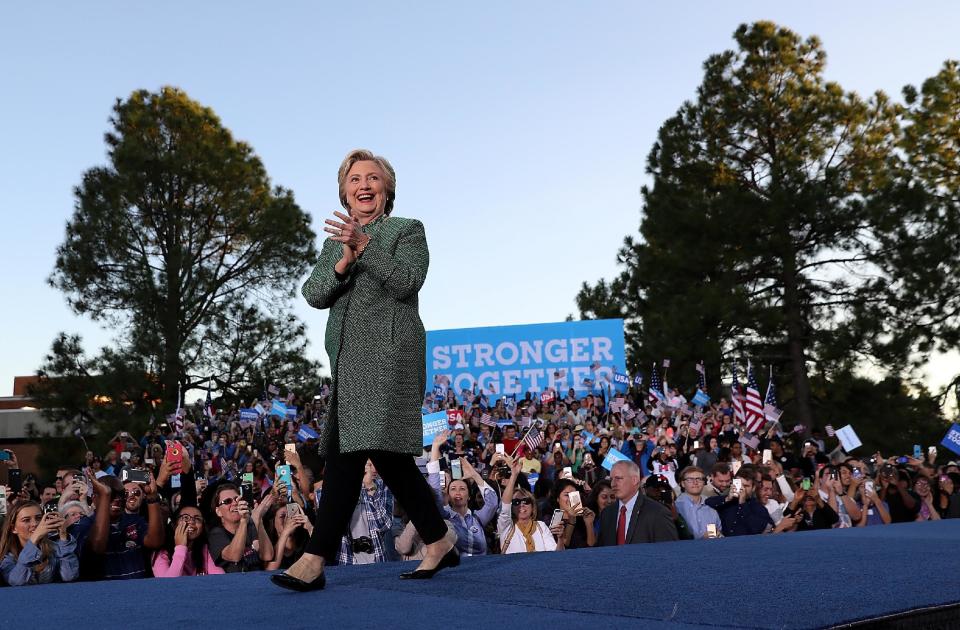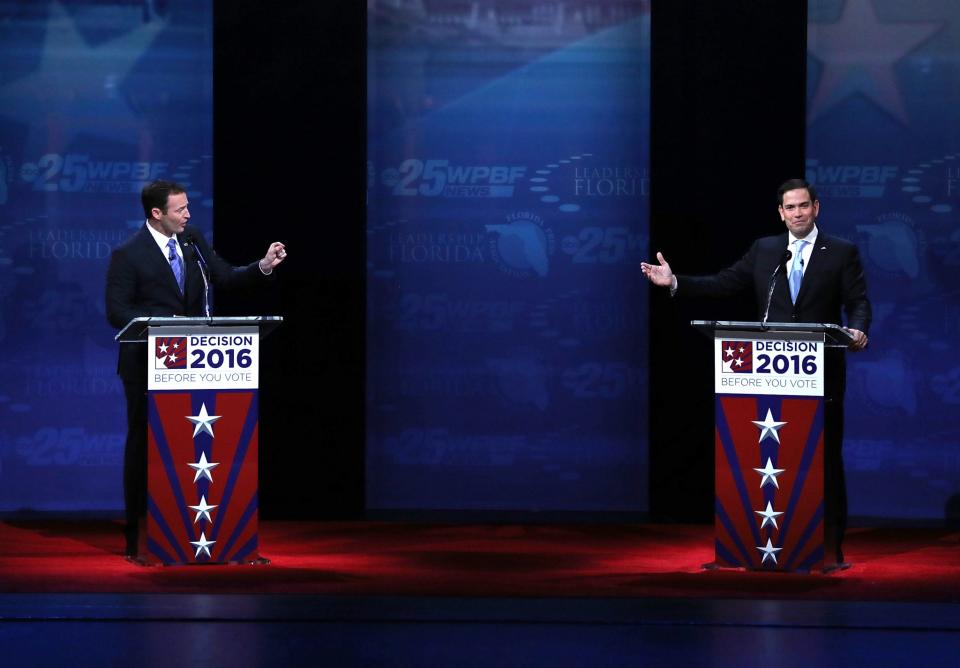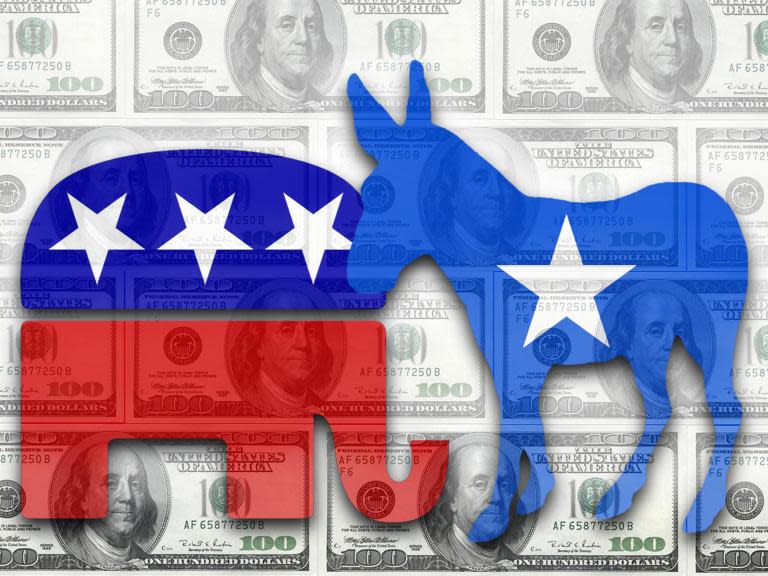Down Ticket #24: Trump only cares about himself. How that’s hurting the GOP in the homestretch

Down Ticket is Yahoo News’ complete guide to the most fascinating House, Senate and governors’ races of 2016. Coming to you every Tuesday and Thursday until Nov. 8. What you need to know today.
_____
Forget the presidential election. We’re already 84 percent (or is it 92 percent? 97 percent?) sure who the next leader of the free world will be. The remainder of the 2016 campaign — all 12 days of it — is mainly about what happens to the rest of the ticket.
Most people in politics have pretty much accepted this reality — even the two people still (technically) competing for the White House.
Sure, Donald Trump and Hillary Clinton show it in different ways. Clinton, as usual, is taking the more traditional route, redirecting her attention and her resources — including a sizeable portion of her more-than-sizeable $150 million war chest — into helping the rest of her party’s candidates succeed on Nov. 8.
When visiting a state with a key Senate race, for example, she has started to go to the trouble of telling people not to vote for the Republican.
“How much more does Pat Toomey need to hear?” Clinton said Saturday in Pittsburgh. “If he doesn’t have the courage to stand up to Donald Trump after all this, then can you be sure he’ll stand up for you when it counts?” On Sunday she said something similar about GOP Sen. Richard Burr, the embattled North Carolina incumbent.

At the same time, Clinton is spending $6 million to boost turnout in Florida, Iowa, Nevada, New Hampshire, Ohio and Pennsylvania (all states with competitive Senate contests and/or winnable House seats) while funneling another $2 million into Arizona (a red state where Clinton and congressional Democrats seem to be gaining steam). Even President Obama is getting in on the act, slamming Republican Senate nominee Joe Heck in Nevada, rolling out more than 200 House and state legislative endorsements and recording dozens of local TV and radio ads in the final days of the cycle.
Trump has chosen a different path.
The standard narrative is that the Manhattan mogul’s historic unpopularity, destructive debate performances, nonstop controversies, and continued reliance on divisive rhetoric, even in the face of declining poll numbers, have made it difficult for House and Senate Republicans to avoid to getting dragged down with him. All of that is true. But even more remarkable than what Trump is doing to hurt his fellow Republicans is what he isn’t doing to help them.
Take fundraising. Through Sept. 30, the Trump campaign raised $40 million for the Republican Party via Trump Victory, a joint fundraising committee; in turn, the RNC has relied on that money to help pay for hundreds of national field staffers, who are working to turn out voters on behalf of the entire Republican ticket.
But in an interview Tuesday with the Washington Post, Steven Mnuchin, Trump’s national finance chairman, said that Trump Victory wouldn’t be holding any more formal fundraisers for the GOP.
“We’ve kind of wound down,” Mnuchin explained. “There is virtually nothing planned.”
In comparison, Clinton headlined a fundraiser Tuesday night in Miami, and her campaign has 41 other high-profile fundraising events — headliners include Chelsea Clinton, Tim Kaine and Cher — scheduled between now and Nov. 3.
Same goes for Trump’s stump speech. Unlike Clinton, he isn’t hammering the other party’s Senate candidate or extolling the virtues of his own party’s alternative every time he lands in a battleground. True, this strategy wouldn’t work where Trump is trailing. But in states where he’s still ahead — Indiana, Missouri — a little free, top-of-the-ticket media could boost conservative turnout and aid vulnerable Senate GOP candidates.

Instead, after weeks of railing against Washington Republicans and shouting “drain the swamp” from the dais, the closest Trump has come to rallying his fans behind anyone other than Donald Trump is a single perfunctory sentence, delivered Sunday in Naples, Fla.
“Go out and vote,” Trump said, “and that includes helping me reelect Republicans all over the place.”
After which he added, reverting to form: “I hope they help me too! It’d be nice if they help us too, right?”
(Trump went on to not mention Florida Sen. Marco Rubio, who is locked in a tough reelection battle against Democratic Rep. Patrick Murphy.)
While the Clinton campaign is figuring out how to maximize Democratic gains in the House and Senate, Trump could at least be figuring out how to minimize the damage he’s doing to other Republican candidates. He seems more preoccupied, however, with minimizing the damage he’s doing to his own brand, holding a pair of events Tuesday and Wednesday — one at the Trump National Doral Miami golf resort, the other at the new Trump International Hotel in Washington, D.C. — designed to showcase core themes like how “bookings are through the roof.”
“I’ve never seen scissors that look so beautiful before,” Trump said as he cut a ribbon Wednesday.
In the meantime, down-ballot Republicans are scrambling to do what neither they nor their Democratic counterparts have ever really had to do: find a way to win in spite of a nominee who wouldn’t mind if they lost.
So far, the party’s strategy seems to be whatever works. Some Republicans are leaving Trump for dead and pitching themselves as a brake on the next president (i.e., Hillary Clinton). As New York magazine’s Eric Levitz recently noted, “one of the party’s most powerful super-PACS, the Congressional Leadership Fund, is launching a series of ads decrying congressional Democrats as ‘rubber stamps’ for President Hillary, while the U.S. Chamber of Commerce and the Senate Leadership Fund are already airing commercials that implore voters to check Clinton’s power by electing GOP senators.”

In Minnesota, as Politico has pointed out, Republican Stewart Mills is airing a TV commercial that says his opponent, Democratic Rep. Rick Nolan, “would give Hillary a blank check to run up trillions in new debt and job-destroying taxes.” In upstate New York, the National Republican Congressional Committee has been running an ad that urges voters to support GOP House candidate Claudia Tenney, who will “stand up to Hillary Clinton.” And in Arizona, GOP Sen. John McCain recently released a video in which he says that “if Hillary Clinton is elected president, Arizona will need a senator who will act as a check, not a rubber stamp, for the White House.”
Meanwhile, other vulnerable Senate Republicans — namely the ones in states where Trump is behind in the polls — have been doing the opposite: pulling their punches against Clinton because they know “they’ll need help from some of her supporters to survive on Election Day,” as The Hill recently reported:
In Ohio, Sen. Rob Portman’s campaign has recruited people at Clinton rallies to sign up for pro-Portman yard signs and has touted his union endorsements. …
In Pennsylvania, Sen. Pat Toomey has released a new ad highlighting the praise he’s received from Clinton’s running mate, Sen. Tim Kaine, who has touted Toomey’s “seriousness, intellect and civility.”
In Florida, Sen. Marco Rubio has declared he’s not interested in pouncing on embarrassing revelations about Clinton’s campaign made public by WikiLeaks. His campaign website this week also proudly displayed the members of the “Democrats for Marco” coalition.
Sen. Kelly Ayotte, meanwhile, eschews presidential politics on her campaign website. Instead, she stresses bipartisanship, claiming she breaks through “gridlock” to deliver results for New Hampshire.
The strategy seems to be working. In 2012, Republican presidential nominee Mitt Romney did considerably better on Election Day than his party’s Senate candidates, outperforming them in 21 of 32 races by an average of 5 percentage points. This year the opposite is true: Trump is doing on average between 4 and 5 percentage points worse than down-ballot Republicans; he currently trails his senatorial ticket-mates in 19 of the 29 races with at least one poll. On the House side, Republican candidates in suburban swing districts — Illinois’s Bob Dold, New York’s John Katko, Virginia’s Barbara Comstock, Florida’s Carlos Curbelo — are performing even better, outrunning Trump by 10, 15, even 20 percentage points.

The scary thing for the GOP is that it might not matter. If Trump depresses Republican turnout on Nov. 8 — because he has slipped so far behind Clinton that the race looks like a foregone conclusion; because he doesn’t have any ground game; because he keeps saying the election is “rigged” — then the rest of this year’s Republican candidates will suffer, regardless of how cleverly they have avoided him.
In a way, it would be a fitting end to a campaign that was all about Trump.
_____
Follow the money

$742 million: The total amount that Democrats and Republicans will have spent on Senate races between January 2015 and Nov. 8, 2016
$125 million: The amount that Democrats and Republicans will spend on the six most competitive Senate races — Pennsylvania, North Carolina, New Hampshire, Indiana, Nevada and Missouri — in the final two weeks of the campaign alone
(Source)
_____

The best of the rest
I went to N. Carolina to see how a traditionally conservative county is handling 2016–GOP defenses were weakening. https://t.co/fGHpUvjB6L
— Clare Malone (@ClareMalone) October 27, 2016
Pat Toomey & Katie McGinty's messaging in Philadelphia doesn't exactly match their messaging in the rest of #PASen. https://t.co/Lj6NFQ7sNj
— Kevin Robillard (@PoliticoKevin) October 27, 2016
Republicans face their reality: Things are not looking good, via @Hillhulse https://t.co/lsJhR2zD2k
— NYT National News (@NYTNational) October 27, 2016
Clinton, Trump are battling it out in N.H. but it's the Senate race that could really be affected via @CHueyBurnsRCP https://t.co/dBAqXMhxdV
— RealClearPolitics (@RealClearNews) October 27, 2016
GOP's early vote worries mount https://t.co/piNF3jmKbi | Getty pic.twitter.com/6ILGbTSOtU
— POLITICO (@politico) October 26, 2016
_____
Countdown
_____
(Cover tile photo: Jonathan Ernst/Reuters)




